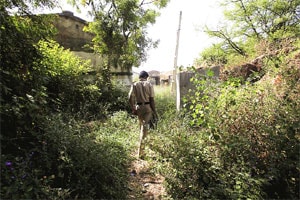Day after Sadarpura verdict: We dont go there,the ghosts wont allow us
Sardarpura,where 33 Muslims were burnt alive,mourns,shuts down

The day after a special court handed life sentences to 31 people for burning alive 33 Muslims,Sardarpura,the theatre of the post-Godhra carnage of 2002,was in deep mourning.
The village leaders,mostly Patels,who had called a bandh to protest the convictions and sentences,sat at the village chabutara largely in silence,reading newspaper reports on the verdict.
monthly limit of free stories.
with an Express account.
The dusty,cracked roads of the village were empty,shop shutters down. Shops in the market had been the first to be attacked in the post-Godhra frenzy,followed by the Sardarpura mosque and,finally,Sheikh Mohalla,where the worst carnage took place.
Every tenth resident of Patel-dominated Sardarpura was once Muslim; today,only 22 Muslim families live here. None of them wanted to talk,except the 52-year-old caretaker of the mosque,Munaf Khan Pathan,and his 15-year-old son Mushtaq.
Mushtaq pointed out Sheikh Mohalla a small warren of streets,lined by a cluster of burnt-out shells of what were once homes,partly hidden behind a cowshed,and covered by weeds,creepers and bushes some three feet tall. On one side of the mohalla is a graveyard; on the other,new double-storey Patel homes.
That is the colony, Mushtaq said. We dont go there. The ghosts of the sheikhs wont allow us in. But you can still smell the smoke around there.
A powerful stench of cowdung and human excreta hangs over the row of ruined houses,once home to the labourer victims of the massacre. The small pucca house in which 33 people were locked and burnt alive has been painted over,but the window frame is still sooty; the metal grill corroded.
The backyard of the Pathans home overlooks the entrance to the mohalla. When I look there,I can see the faces of my friends screaming for help, said Mushtaqs father Munaf Pathan. We were under house arrest. Those of us who tried to jump the wall to help them were threatened with dire consequences. The rioters had blocked our colony from both sides.
Pathan recalled a conversation in the village the day before the massacre one that was meant probably to deliver a chilling warning to the Muslims. My friends wife had gone to buy flour at a grocery store a day before the riots. The store owner said,Prepare pakodas for the last time for your family, Pathan said.
We cant believe the Patels were planning to target their own employees who were working so hard in their farms.
Pathans home was damaged in the rioting,but he decided to stay on in the village of his forefathers. Today,Pathanwadi is the only Muslim pocket in Sardarpura,home to the 22 Muslim families in the village. Their only good neighbours are some tribal families. The other Muslims the Memons,the Nagoris and the Mansooris migrated after suffering irreparable losses in their businesses. And the Sheikhs who survived the massacre fled forever.
Nine years on,all weddings and festivals in Pathanwadi are celebrated under police protection. Munaf Pathans nephew Zubair is getting married on Friday,and the caretakers home and mosque have been decorated for the occasion. Policemen with guns were sitting on plastic chairs at the entrance to the wedding venue.
The Muslims stay as far as they can from the Patel homes; no one wants trouble. The Patels have always been the rulers in Sardarpura. No Muslim has ever contested a panchayat election. Kachra Patel,who was sarpanch when the massacre happened,was convicted yesterday.
Some Patels in Sardarpura do acknowledge a sense of loss. Dr Devendra Patel misses a certain mute boy,the son of a local Muslim painter,Babu Miyan Sheikh,who would come to his dispensary. Dr Patel was a year junior to Chief Minister Narendra Modi at B N Vidyalaya in Vadnagar.
He would often eat lunch at my place and take one rupee,to offer at the temple opposite. It was only later that we came to know that Babu and his family had been burnt alive in Sheikh colony, Dr Patel said.
He added,Those who died were innocent,faithful workers of the Patels.
Dr Patels friend,75-year-old retired high school teacher Babu Patel,said,After the riots,even the Patels had differences among themselves. Kachras involvement in the riots upset many of us. We were no longer supporters of the panchayat.
But the family of Kachra Patel feels bitter and cheated.
Karva wada bija hata,aamne charvi nakhya (Others did this,but we were trapped), said Mahesh,Kachras son. We are making losses in agriculture,spending our earnings on court cases. We want the real culprits caught.
The home of 75-year-old Mangal Patel and his son Jayanti (45) shares a back wall with Sheikh Mohalla. Father and son were sentenced to lives in prison yesterday. Said Hardik,Jayantis son,I grew up almost in Sheikh Mohalla. I was only 14 when the riots happened. My two best friends,Zakir and Shabbir Qadar Sheikh,are missing ever since.
The Muslims of Sardarpura have virtually nothing. All Muslim families together own only 52 bighas of land. The Patels,by contrast,have between 2,000 and 3,000 bigahs.
But yesterdays verdict has been satisfying. Said Munaf Pathan,There is a saying in the Quran that goes,Allah is with those who have patience.